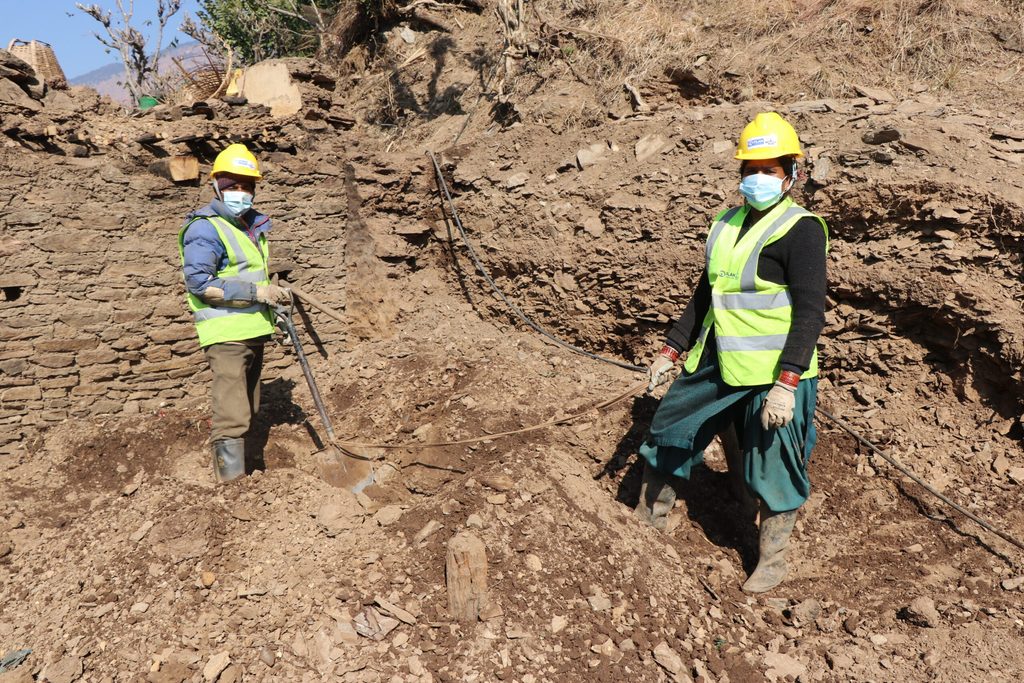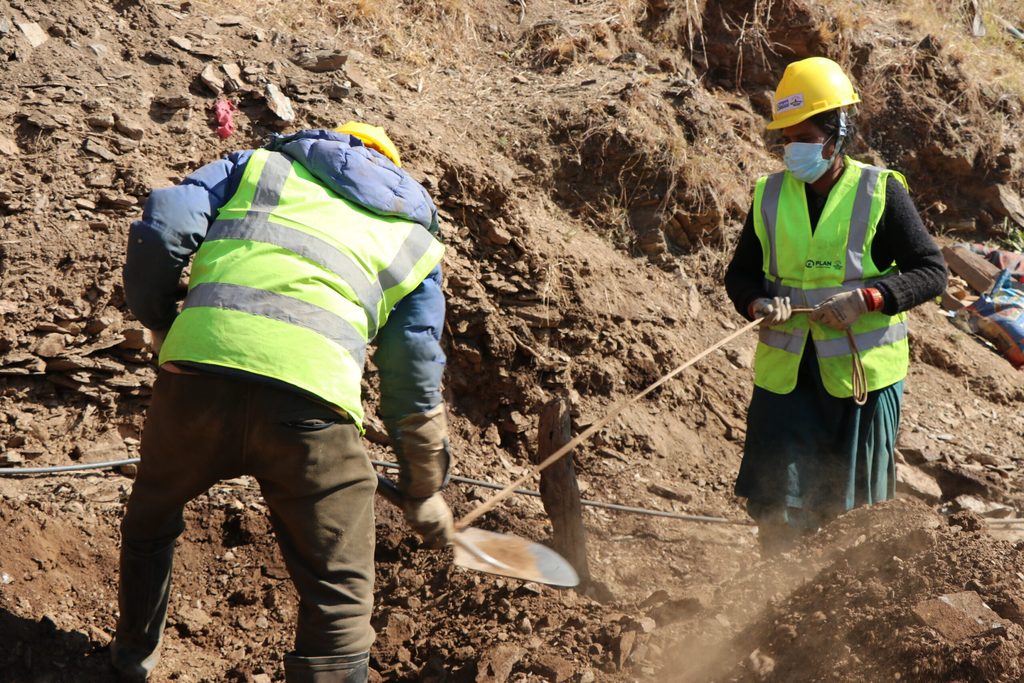Deepa and Parbir: Earning while rebuilding their community
Deepa and Parbir are migrant workers who were away from home when a devastating earthquake struck Jajarkot and Rukum West on November 3, 2024. Since then, they have been working tirelessly to rebuild their community, learning new skills, and earning an income.
“I couldn’t sleep all night, filled with worry for my family back home. Hearing the news of the earthquake while I was away brought a wave of anxiety. I felt powerless, I longed to be there with them,” says 42-year-old Deepa from Rukum West. “Just working and earning isn’t always enough.”

In the heart of a bustling migrant worker community in India, Deepa and Parbir, a devoted husband and wife, were working as labourers, sending their hard-earned wages back home to Nepal. With a family of 7 depending on them, including Parbir’s mother and their children, they sacrificed being away for most of the year to provide for their loved ones.
Earthquake night
When news of the earthquake in Nepal reached them, at first they thought it was just a small quake and nothing to worry about, but when they discovered that the earthquake had struck western Nepal, killing more than 150 people and injuring close to 400, their concern grew.
“We couldn’t sleep all night. We tried reaching our kids, but the network was jammed. Finally hearing our son’s voice was a relief, even though we heard that our home was damaged,” shares Deepa. “Our daughter’s plea to come home touched our hearts deeply. It was the driving force behind our decision to leave our jobs and return home as soon as possible.”
“Our daughter’s plea to come home touched our hearts deeply. It was the driving force behind our decision to leave our jobs and return home as soon as possible.”
Deepa
As they journeyed back home, Deepa and Parbir clung to every piece of information they could gather, listening intently to the radio and scouring social media for updates. However, the flood of speculation and rumours only added to their anxiety, especially with news that another earthquake had struck the western part of Nepal.
It took Deepa and Parbir a week to make the arduous journey back to their village, navigating destroyed roads and debris. Arriving home, they were met with the harsh reality of destruction – their home had completely collapsed and lay in ruins. However, their family was intact, and their homecoming brought everyone a sense of relief.
The family’s remote house in Rukum West district meant that no government assistance had reached their family. Fortunately, Deepa had recently sent money home to pay for a family celebration, so they were able to used these funds to purchase essential supplies such as food and tarpaulins for shelter.
During the earthquake, Parbir’s mother was injured. “My mother-in-law, who is usually strong-willed and resilient, was left speechless and in shock. She had been sleeping on the ground floor at the time of the earthquake and had been unable to escape in time.”
Days of hardship
With their homes reduced to rubble, the family found refuge in the village school, one of the few buildings still standing. Along with the rest of the community, they pleaded with the local government for assistance. Eventually, the authorities responded by providing tarpaulins and packages of rice.
Before this aid arrived, Deepa and her family salvaged whatever little food they could find amidst the ruins of their home, washing away the mud that coated it to make it edible. “I may be clearing debris from my own home now, but the skills I’ve gained from my work in India will help me to rebuild not only my house, but also my family’s future,” says Deepa with determination.
Rebuilding their home and lives
As the family began the daunting task of repairing their home, an emergency response team from Plan International and SAC Nepal visited the village to assess the extent of the damage to each household. Following their evaluation, Deepa and Parbir were invited to a meeting the next day.
At the meeting, Deepa and Parbir were introduced to a cash-for-work scheme, which aims to support families affected by the earthquake by offering them paid work clearing the debris left by the quake. “They assured us that we would be provided with the necessary tools and equipment for the task, and upon completion, we would receive Rs.15,000 as per government regulations,” explains Parbir.
“They assured us that we would be provided with the necessary tools and equipment for the task, and upon completion, we would receive Rs. 15,000 as per government regulations.”
Parbir
“As we neared the completion of the debris clearance, we received regular visits from engineers from the organisations who provided valuable guidance and instruction, ensuring that our work proceeded smoothly and safely. Additionally, they’ve trained us on important safety measures to follow during emergencies, and have even provided us with toll-free numbers to reach out to if we have any questions or concerns,” says Parbir.
Deepa says, “In India, safety wasn’t a priority at work, but here with Plan International and SAC Nepal, they ensure our safety, and well-being, and provide us with essential safety gear. It’s a comforting change.”

Asked about their future plans, Parbir says that once he has been able to rebuild their home, he and will return to India to look for work so he can continuing supporting his family financially. For now, his earnings are only able to cover the cost of building a temporary shelter made from some of the materials salvaged from their home.
Deepa has made the decision to stay in Jajarkot so she can take care of the family. “My eldest son has recently married at the age of 18. While I know it’s a child marriage and I wish things were different, I have to accept the reality and support my family as best as I can.”
Cash-for-work programme
Deepa explains her view on the cash-for-work programme, “It’s not just about earning money; it’s about regaining control and rebuilding our lives. Through this, we’ve been able to earn income while contributing to the reconstruction efforts in our village.”
Parbir adds: “What’s truly valuable is the support and guidance we’ve received along the way. Plan International and SAC Nepal haven’t just handed us tools and left us to figure things out. They’ve provided training on safe construction practices, ensuring that we can work effectively while prioritising our safety. This has been crucial for someone like me, who’s worked in construction but never had any formal training.”


